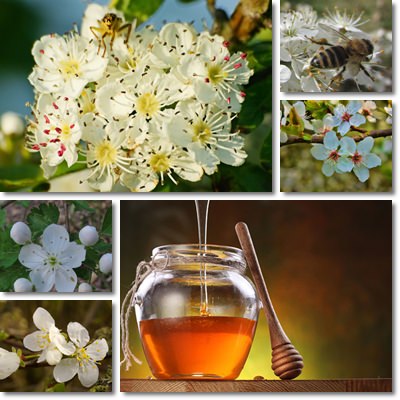Hawthorn (Crataegus monogyna and Crataegus oxyacantha) is a species of shrub traditionally used for treating cardiovascular disease, notably heart failure and hypertension. The flower nectar of the species is the source of the famous hawthorn honey, a gorgeous dark amber variety with great flavor, antiseptic and antioxidant properties, soothing and energizing effects as well as cardiovascular benefits. Hawthorn herbal tea together with hawthorn honey reunite their action and make a wonderful natural therapy with beneficial effects on multiple aspects of our health.
What does hawthorn honey mean? This particular honey variety is made from the nectar and pollen of hawthorn flowers that bloom around May, hence the other popular names for the species such as mayblossom, maythorn or may. Despite the fact that hawthorn is an invasive species in most parts of the world (North America, Europe, Asia), the honey is often difficult to obtain. It has been speculated that hawthorn plants generally yield less nectar than other species in bloom at the same time of the year and that other species such as sycamore may present themselves as more appealing to the bees. Even when the nectar source is plentiful, which is known to occur every few years, honey bees face competition from other insect species.

While many beekeepers report it is difficult for their honey bees to source sufficient amounts of nectar and pollen from hawthorn flowers to produce honey that is pure or find their honey bees are not particularly interested in hawthorn flowers when other species are in bloom, the worldwide production of this particular variety of honey is rather steady. However, it is important to make sure you purchase certified hawthorn honey because it is not uncommon for other types of honey to be passed off as hawthorn (sycamore honey is commonly marketed as hawthorn).
What does hawthorn honey look like? This particular variety has a rich, dark amber color, often with a greenish tint, but may lose some of its pigment as it crystallizes, turning a lighter, opaque golden color. The same thing is known to happen to other honey varieties such as sunflower or even manuka honey. Read up on your favorite variety on our honey page.
What does hawthorn honey taste and smell like? The honey has a delicate, light, sweet-floral aroma and a rich taste profile, reminiscent of the nectar of the flowers, but with a nutty aftertaste. The nutty aftertaste is said to be a result of the presence of propolis, which is used to seal off beehives and their honey. It also has a dense consistency.

What is hawthorn honey good for?
The variety boasts the following properties and health benefits:
1) Natural antimicrobial properties. Like all honey varieties, hawthorn too has great natural antimicrobial properties. The honey not only inhibits bacteria growth, but also reduces bacterial load where there is an existing infection, hence the reason why honey is now starting to be used in sterile bandages. The antimicrobial action is attributed to the hydrogen peroxide content of the honey, but also low moisture content, acidic pH and presence of certain phenolic antioxidants with antiseptic effects (Honey: its medicinal property and antibacterial activity).
Honeybees break down flower nectar into simple sugars. One of this simple sugars, glucose, reacts with an enzyme produced by the bees called glucose oxidase to produce hydrogen peroxide, a strong antimicrobial agent responsible for the most part for the antimicrobial action of all honey varieties except for manuka. Depending on the type of honey, its hydrogen peroxide content, amount used, the region where it comes from, processing or lack of and other factors, antimicrobial properties may vary considerably between different varieties and within the same variety. The low moisture content and acidic pH of the honey as well as the presence of antioxidant compounds with antimicrobial activity further contribute to preventing bacterial growth.
2) Antioxidant properties. All honey types contain powerful antioxidants in the form of phenolic acids and flavonoids. Antioxidants protect our cells against the harmful action of free radicals. Free radicals are reactive oxygen molecules that can damage cells to such as extent they can make them go haywire and live beyond their normal lifespan, reproducing uncontrollably and causing tumors and cancer. By affecting normal cell function and encouraging mutations, free radicals additionally encourage the development of chronic disease such as cardiovascular diseases or degenerative nerve or muscle diseases. Antioxidants have been shown to offer protection against this type of damage called oxidative stress, hawthorn honey being a good source of them.
3) Source of essential nutrients. In addition to phenolic antioxidants, hawthorn and other honey varieties are an excellent source of simple carbohydrates, not to mention they contain enzymes, protein and dietary minerals such as potassium, calcium or magnesium. All of these different types of elements make honey a nourishing food.
4) Energizing effect. Because it is mostly simple carbohydrates, in other words natural sugars, hawthorn honey has a particularly strong energizing effect. When we are feeling low on energy, it can do us good to enjoy one or two tablespoons of raw honey to perk us up. Eating one or two tablespoons can efficiently prevent us from becoming hypoglycemic when we’ve delayed eating for too long.
5) Soothing action. Honey in general has a soothing action, particularly on mucous membranes such as the lining of the stomach or throat. Its consistency makes it adhere to mucous membranes, creating a sort of protective shield that allows them to heal. Moreover, it has been discovered that certain components in the honey stimulate the regeneration of the stomach lining, hence the reason why it helps improve digestive health and conditions such as gastritis or ulcers.
Hawthorn and other honey varieties are used largely for respiratory tract infections and digestive problems. It is recommended to eat one or two tablespoons of honey every 3-4 hours to help soothe a sore throat and relieve cough. This also helps reduce bacterial load and promote faster recovery. The honey is best consumed raw and unheated and allowed to take effect by postponing eating and drinking for at least 30 minutes to an hour. For digestive upset, it is best consumed raw, on an empty stomach, preferably in the morning, 30 minutes to an hour prior to eating or drinking anything.
6) Boasts cardiovascular benefits. Hawthorn honey remains faithful to the main medicinal properties of the plant: its cardiovascular benefits. It has been suggested that regular consumption of moderate amounts of this particular variety can contribute to maintaining cardiovascular health, but mechanisms of action are unclear. Bioflavonoids and other compounds present in the honey as well as in other parts of the plant such as the flowers, berries, seeds and leaves are believed to be the ones responsible for such benefits. Hawthorn honey can be used in combination with hawthorn tea, in which case it exerts a calming, relaxing action which further benefits the cardiovascular system.
Because all honey contains pollen in variable amounts, there is always the possibility of an allergic reaction. If you know or suspect you are allergic to hawthorn, it might be best to refrain from consuming this particular variety of honey until you’ve had an allergy test. Similarly, if you are allergic to plant pollen in general, it is best to avoid eating hawthorn and other types of honey until an allergist gives you the okay because honey contains pollen, some varieties more than others.
Conclusion
Overall, hawthorn honey is a healthy product with a variety of beneficial effects on human health. The raw, unprocessed, unheated honey is preferred. The closer the honey is to its natural state, the healthier it is for us. For this reason it is important to always go for certified products from reliable sources and avoid cheap products that offer no guarantees. Real honey is worth its price considering its pure nature, nutritional value and beneficial properties.
